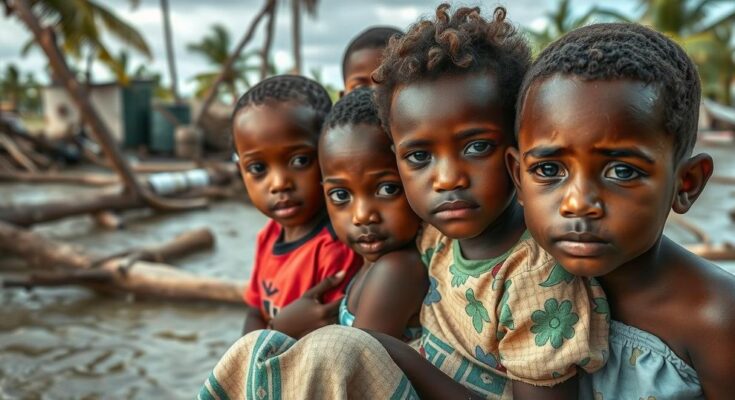Cyclone Chido devastated northern Mozambique, impacting around 90,000 children and displacing thousands of families. The cyclone destroyed over 35,000 homes, with significant infrastructure damage, including classrooms and healthcare facilities. Humanitarian efforts are underway, but urgent needs persist as the region grapples with food insecurity and disease outbreaks.
Tropical Cyclone Chido has inflicted severe damage across northern Mozambique, particularly in the Cabo Delgado province. The storm led to the destruction or damage of over 35,000 homes and has adversely affected approximately 90,000 children, as reported by UNICEF. The cyclone’s impact, characterized by destructive winds and heavy rains, has disrupted essential infrastructure, including classrooms and health facilities, exacerbating existing challenges faced by the region.
The current situation indicates that nearly 174,000 individuals have been affected, a number that is expected to rise as further assessments are conducted. Notably, at least 186,000 classrooms have been rendered unusable, and the storm has also impacted 20 healthcare facilities. Areas near the city of Pemba have experienced significant infrastructural damage, leaving many communities vulnerable.
According to Mary Louise Eagleton, UNICEF Representative in Mozambique, “Mozambique is considered one of the most affected countries in the world by climate change and children were already experiencing several life-threatening emergencies before Cyclone Chido, including conflict, drought, and disease outbreaks.”
The Cabo Delgado region has faced years of conflict, which has displaced over 1.3 million individuals, predominantly women and children. Following the cyclone, many families have found their precarious recovery efforts once again jeopardized. The storm also impacted areas beyond Cabo Delgado, testing infrastructure in neighboring provinces, and increasing the risks of a cholera outbreak already present in the region.
In the wake of the disaster, humanitarian agencies are mobilizing efforts to address the urgent needs of those affected. The UNHCR has provided immediate aid, including essential supplies such as blankets and emergency shelters, to citizens in the region. Preliminary assessments suggest that around 190,000 individuals require humanitarian assistance, and the situation remains critical.
António Guterres, the UN Secretary-General, affirmed that UN teams are actively engaged in providing emergency support, with financial allocations being made to enhance relief efforts. The WFP plans to intensify its activities to reach the most affected populations as food insecurity looms on the horizon.
Mozambique frequently grapples with climate-related challenges, making it one of the nations most vulnerable to the effects of climate change. Tropical Cyclone Chido exemplifies this vulnerability, having struck northern Mozambique and exacerbating pre-existing crises like conflict and health emergencies. The extensive damage inflicted by this cyclone on infrastructure, homes, and educational facilities undermines community resilience and poses significant risks to children’s wellbeing and safety, necessitating urgent humanitarian action.
In conclusion, Tropical Cyclone Chido has caused considerable destruction in northern Mozambique, affecting tens of thousands of children and displacing thousands of families. The widespread damage to homes, schools, and health facilities highlights the urgent need for humanitarian assistance in the region. As organizations mobilize to provide aid, the situation remains dire, underscoring the compounded challenges of climate change, conflict, and health crises in Mozambique.
Original Source: news.un.org




